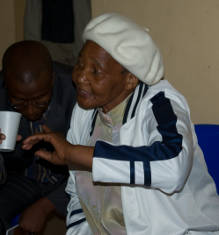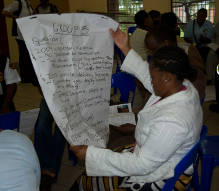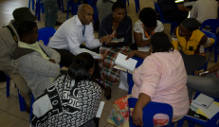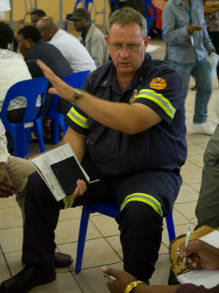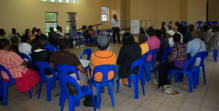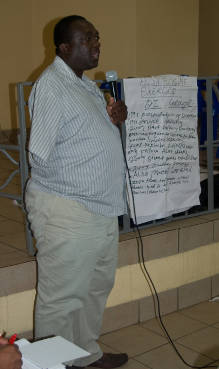March 2, 2010 –The Nelson Mandela Foundation (NMF) held its first Diepsloot township community conversation, after the xenophobic violence that rocked the community in 2008.
The dialogue took place on February 25, 2010, at a hall in Neighbourhood Centre A, Diepsloot, and brought together community members, City of Johannesburg local government officials and representatives of non-governmental organisations to discuss what fuelled the violence in 2008, and to start building social cohesion and a stronger sense of community.
The Diepsloot township is often a reception area for foreign nationals who come to South Africa. Poverty is high, local government resources are limited and service delivery is patchy. There have also been ongoing disputes, which frequently erupt into violence, between members of the taxi and bus industries, over the provision of public transport services in the area.
Kindiza Ngubeni, a facilitator with the Centre for the Study of Violence and Reconciliation, said: “It is difficult for the community to accept non-nationals as they tend to isolate themselves from the community. Today we will find out the issues and engage the Diepsloot community on how we can assist it to assist itself.”
This conversation was the first, in this area, in a series of such events that aim to explore the reasons for the violence in the community just outside Johannesburg, and to assess what structures are in place to respond to these issues.
Facilitator Jean Pierre Kalala said: “Diepsloot is one of those areas where violence against non-nationals is rife. There is a huge community of non-nationals in Diepsloot and it’s likely that if we don’t do anything, such violence could happen again in the near future. This is the first session in Diepsloot, so our main objective is to help the community understand the key issues of violence and to explore the key factors that spark violence in the community.”
During the dialogue, the Nelson Mandela Foundation and its implementing partners use the Community Capacity Enhancement (CCE) methodology to empower the local community, by building its capacity to deal with the challenges it faces internally.
Timothy Zulu, community development worker with the National Children’s and Violence Trust, said: “It is important to understand the dynamics of this community, its cultures and religions and also to start engaging ourselves. We must not work separately; we need to understand who is doing what and identify challenges and stakeholders who are able to assist.”
Participants worked through a historical timeline exercise, a tool that helps the community plot significant events that led up to the xenophobic attacks, while getting people to engage one-on-one with each other.
Sam Sikhosana, a local government community development worker, said: “It’s very important to have a conversation to understand the issues at the grassroots level. We want to embrace humanity and this helps people know who they are and it breaks that phobia mentality.”
The main events identified during the historic timeline exercise were the service delivery protests during 1998, the Reconstruction and Development Programme housing crisis of 2004 and the bus and taxi disputes of 2008, all of which contributed to doubt in local government’s ability to function and provide leadership.
Participants also mentioned that the number of foreign nationals has steadily increased in the township and that these people were given access to scarce resources, which created a feeling of distrust between the local and non-national communities.
Bea Abrahams, Community Conversations Implementing Partner, said that the dialogue highlighted the need for leadership at a local level and the need for clear communication around responsibility in elective structures.
She said: “Other issues that emerged were the need for the community to take responsibility to elect leadership that is truly credible and representative of its views. A further issue that has emerged from community conversations across the country is the need for sustaining substantive conflict resolution mechanisms within the community.”
Somalian community leader, Mohammed Hassan, explained that getting people talking is important, but that the programme needs to be extended to include the wider community.
Jean Pierre Misago, a researcher at the Forced Migration Studies Programme at the University of the Witwatersrand, said: “In terms of the organisation of the dialogue, we need more community members to come through; otherwise we can’t have a proper discussion. We need to hear the views of the community; they need to present their issues. Otherwise it doesn’t make sense. We must make it feel like the community owns this process.”
The conversation was a safe space for community members to discuss the major challenges they face and the hope is that, in the future, a larger number of participants will attend to bring diverse voices to the discussion.
Dr Mothomang Diaho, Head of the Dialogue Programme at the Nelson Mandela Foundation said: “This conversation has reaffirmed the importance of providing a safe space for the community to express its feelings. I hope the provision of a safe space is something we can sustain – not just the Nelson Mandela Foundation, but the communities finding solutions for themselves. I am happy that there is another opportunity on March 16, 2010, to take these issues further.”
In the March conversations, participants will discuss solutions to the problems they have identified, and how best to start building an integrated community in an area with a history of violent protest, and where distrust of non-nationals and the government is widespread.
